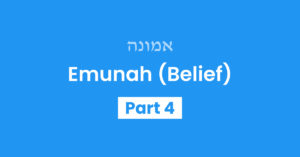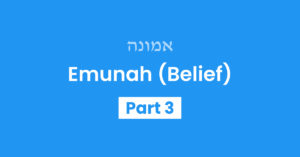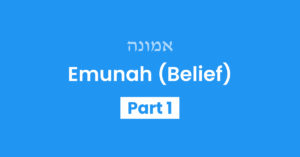Last week, we explained how Yetzias Mitzrayim built the foundation of our entire Emunah. When the Jewish people in Egypt saw the 10 Plagues – water turned into blood, animals suddenly died, and darkness suddenly descended on Egypt – it proved to us (and to the entire world!) that Hashem controls nature. Just as Hashem miraculously changed the rules of nature in Egypt, Hashem can also change any circumstances that we are experiencing in our personal lives. When we understand this fundamental truth, we are fulfilling the entire purpose of our creation – since Chazal say that the whole reason why Hashem created this world is so that we should learn to have Emunah.
Believing that Hashem can do anything is called believing in “Yecholes” (יכולת) which comes from the root “yachol” (יכול) meaning “capable.” But there is another essential aspect of Emunah, and that is believing in Hashgacha (השגחה).
Believing in Hashgacha means knowing that Hashem is aware of what goes on in this world, He is interested in what’s happening, and He is constantly involved in deciding what will happen in our lives.
Believing in Hashgacha means knowing that Hashem is aware of what goes on in this world, He is interested in what’s happening, and He is constantly involved in deciding what will happen in our lives.
Many non-Jewish philosophers used to believe that Hashem is not interested in what happens on Earth. After all, if Hashem is so great and lofty, why should He care about what happens to little you and me? We are just tiny specks in the cosmos of the universe.
But Yetzias Mitzrayim proved that this is not true. Despite the fact that Hashem is so great, mighty, lofty, and holy – He still cares tremendously about every little thing that happens to us. When the Jewish people were suffering in Egypt, Hashem didn’t turn a blind eye and say, “Why should I care about those lowly creatures on earth?” Rather, Hashem heard the Jewish people’s cries and swooped in to save them.1
Unbelievable Faith During Dark Times
We take it for granted that Hashem saved the Jews from Egypt, but it wasn’t always so easy to believe. For 210 years,2 the Jews were subjected to horrendous torture and oppression. Their babies were slaughtered for Pharaoh to bathe in their blood,3 and innocent children were squeezed into pyramids to serve as replacement “bricks” when any Jew didn’t fulfill his daily quota of work.4
If you were living in Egypt in these times, what would you be thinking?
If you were living in Egypt in these times, what would you be thinking?
Any regular person witnessing such horrific national suffering for 210 years would surely conclude that the G-d of the Jews must have forsaken them. How could G-d let so much suffering go on, and not do anything to save His people?
Yet, when Moshe and Aharon came to tell the Jews that Hashem would soon save them and alleviate their suffering, the passuk tells us something unbelievable: “VaYa’amein Ha’Am – The nation believed.”5 These broken, downtrodden people believed that Hashem would keep His promise to free them from slavery, even though their situation seemed so bleak and they could not yet see even a glimmer of hope.
“VaYa’amein Ha’Am – The nation believed.“
In fact, the Torah tells us that when Moshe first announced that Hashem would soon free the Jewish people, their suffering became even worse. Pharaoh made it even harder for the Jews, and he increased their workload. Now, instead of being given straw to work with, the Jews had to go out and collect their own straw every day.6 At this point, the Jews could have said: “This makes no sense! How can it be that Hashem is really going to save us? If Hashem truly cared about us, then He would have made our workload easier, not harder! It must be that Moshe is not telling the truth.”
But no, the Jewish people did not say this. They had an ancient tradition of Emunah passed down from their fathers and grandfathers that no matter how much they would suffer in Egypt and no matter how dark, dim, and hopeless their circumstances would seem, Hashem would one day save them from suffering. It was this rock-solid Emunah that enabled them to believe in Moshe’s promise that Hashem would save them.
In the Merit of Emunah
We too, sometimes go through dark and difficult times in our lives, when it is difficult to believe that Hashem is truly aware of our pain. It might be when you’re looking for a new job, and it feels impossible to find any good possibilities. Or it might be when you know someone with a terminal illness, and it seems like there is no hope of recovery. Or it might be when you’re studying for a test, and feel like there is no way you’re going to pass.
But just as the Jewish people in Egypt were able to keep up faith that their circumstances could change, we, too, can hang on to our belief in Hashgacha and remember that Hashem can change our circumstances in the blink of an eye.
We, too, can hang on to our belief in Hashgacha and remember that Hashem can change our circumstances in the blink of an eye.
Chazal teach us: In what merit were the Jewish people freed from Egypt? It was in the merit of their incredible Emunah. And just as our ancestors were saved in the merit of their Emunah, we, too, will merit to greet Mashiach and see our Ultimate Redemption in the merit of our Emunah.7 May we be zoche this week to see the hand of Hashem in our lives and not give up hope even when times are dark and rough.
Sources: [1] Shemos 6:5; [2] Nedarim 32a; [3] Rashi on Shemos 2:23; [4] Midrash quoted by Rashi on Sanhedrin 101b; [5] Shemos 4:31; [6] Shemos 5:9-12; [7] Midrash Tanchuma: Beshalach 10, also Kad HaKemach: Emunah
Your Challenge
The Sefer HaChinuch writes that Hashem gave us the mitzvah of mezuzah to remind us that Hashem is constantly watching over us. For this reason, we inscribe 3 letters on each mezuzah: Shin-Dalet-Yud. These letters stand for “Shomer Daltot Yisroel” which means: “Hashem protects the homes of Israel.”
Once a day, while looking at a Mezuzah, say out loud (or whisper to yourself): “Hashem is interested in my life, and involved in deciding what happens to me.”
Try to think of a specific area in your life that you’re worried about, and how Hashem can help you.
FOR EXAMPLE:
- Hashem is the only One who decides how much money I will make this year.
- Hashem is the only One who decides when I will get over this virus.
- Hashem is the only One who decides if my home will be kept safe from intruders.
- Hashem is the only One who decides if there will be mice in my apartment.
- Hashem is the only One who decides if my boss will give me a raise.
- Hashem is the only One who decides if I will make a good impression on my interview.
Torah Questions
- Which of Moshe Rebbeinu’s body parts were called “emunah” in Shemos 17:12?
- Which Navi said to the Jewish people: “How long are you going to sway back and forth between believing in Hashem and believing in Baal (a type of Avodah Zara)?” (Melachim I 18:21)
- What did the Jewish people say when this Navi finally proved to them that Hashem is the real G-d? (Melachim I 18:39)
- Who said “believe in Hashem” in Divrei HaYamim II 20:20?
- Which 2 people said: “Hashem is with us – do not be afraid!” in Bamidbar 14:9?
- When a person dies, the Heavenly Court asks him several questions. One of the questions is: “Did you ____ with Emunah?” (Shabbos 31b)
Questions to Ponder
- When men put on tefillin in the morning, they say the passuk “V’Eirasteech Li b’Emunah – and I shall betroth you to Me [Hashem] with Emunah.” What does it mean to be “betrothed with Emunah”? And what does that have to do with putting on tefillin?
- The Gemara says that the generation of Jews who left Egypt were lacking in Emunah, because when Hashem split the Sea and led them through on dry land, they said: “Just as we are coming out of the Sea on this side, the Egyptians are also emerging from the other side.” But how could the Jewish people have said this, if we also know they sang “Az Yashir” – in which they thanked Hashem for making the Egyptians drown?
- The Mechilta says that Avraham Avinu only earned his Olam Haba (and Olam HaZeh) in the merit of his belief in Hashem. How could this be? Why was Avraham’s Emunah more powerful than the rest of the 10 tests that he passed… including Akeidas Yitzchak – being willing to sacrifice his own son for the sake of Hashem?
- The Midrash writes that Noach was lacking in his Emunah; he didn’t enter the Teivah (ark) until the waters of the flood came up to his ankles. But how could Noach have been lacking in Emunah, if he heard Hashem speaking to him directly? How could he possibly doubt what Hashem had said?





